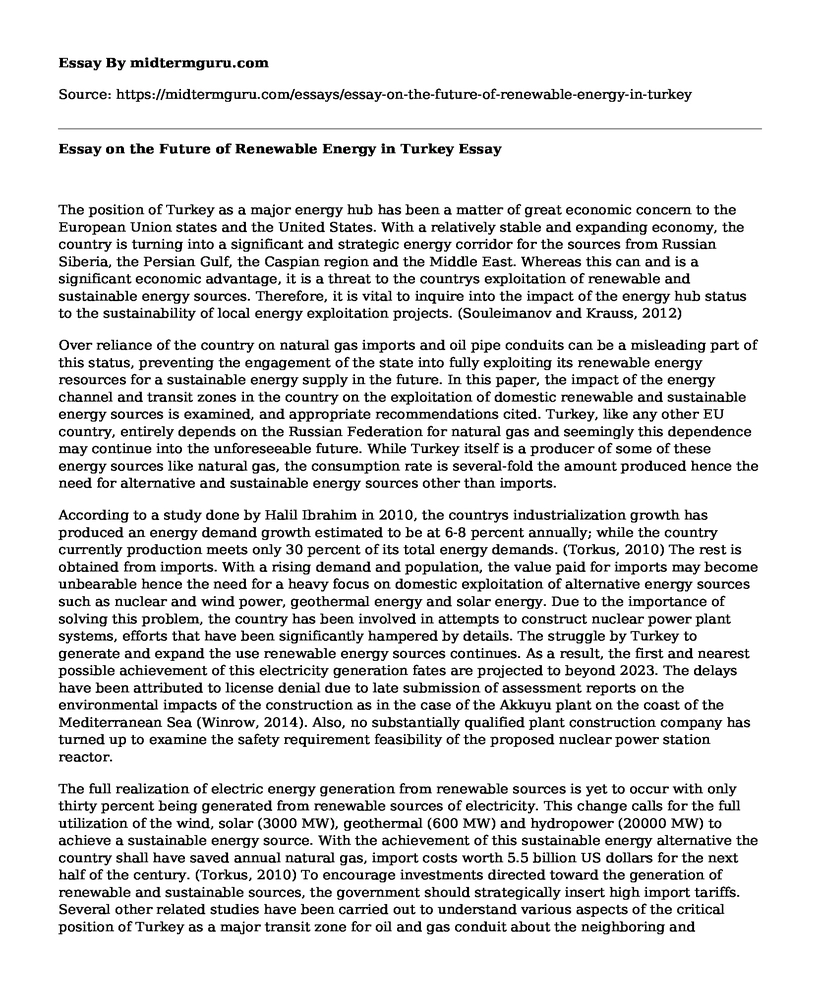The position of Turkey as a major energy hub has been a matter of great economic concern to the European Union states and the United States. With a relatively stable and expanding economy, the country is turning into a significant and strategic energy corridor for the sources from Russian Siberia, the Persian Gulf, the Caspian region and the Middle East. Whereas this can and is a significant economic advantage, it is a threat to the countrys exploitation of renewable and sustainable energy sources. Therefore, it is vital to inquire into the impact of the energy hub status to the sustainability of local energy exploitation projects. (Souleimanov and Krauss, 2012)
Over reliance of the country on natural gas imports and oil pipe conduits can be a misleading part of this status, preventing the engagement of the state into fully exploiting its renewable energy resources for a sustainable energy supply in the future. In this paper, the impact of the energy channel and transit zones in the country on the exploitation of domestic renewable and sustainable energy sources is examined, and appropriate recommendations cited. Turkey, like any other EU country, entirely depends on the Russian Federation for natural gas and seemingly this dependence may continue into the unforeseeable future. While Turkey itself is a producer of some of these energy sources like natural gas, the consumption rate is several-fold the amount produced hence the need for alternative and sustainable energy sources other than imports.
According to a study done by Halil Ibrahim in 2010, the countrys industrialization growth has produced an energy demand growth estimated to be at 6-8 percent annually; while the country currently production meets only 30 percent of its total energy demands. (Torkus, 2010) The rest is obtained from imports. With a rising demand and population, the value paid for imports may become unbearable hence the need for a heavy focus on domestic exploitation of alternative energy sources such as nuclear and wind power, geothermal energy and solar energy. Due to the importance of solving this problem, the country has been involved in attempts to construct nuclear power plant systems, efforts that have been significantly hampered by details. The struggle by Turkey to generate and expand the use renewable energy sources continues. As a result, the first and nearest possible achievement of this electricity generation fates are projected to beyond 2023. The delays have been attributed to license denial due to late submission of assessment reports on the environmental impacts of the construction as in the case of the Akkuyu plant on the coast of the Mediterranean Sea (Winrow, 2014). Also, no substantially qualified plant construction company has turned up to examine the safety requirement feasibility of the proposed nuclear power station reactor.
The full realization of electric energy generation from renewable sources is yet to occur with only thirty percent being generated from renewable sources of electricity. This change calls for the full utilization of the wind, solar (3000 MW), geothermal (600 MW) and hydropower (20000 MW) to achieve a sustainable energy source. With the achievement of this sustainable energy alternative the country shall have saved annual natural gas, import costs worth 5.5 billion US dollars for the next half of the century. (Torkus, 2010) To encourage investments directed toward the generation of renewable and sustainable sources, the government should strategically insert high import tariffs. Several other related studies have been carried out to understand various aspects of the critical position of Turkey as a major transit zone for oil and gas conduit about the neighboring and dependent states. However, these studies have focused on the geopolitical and diplomatic issues surrounding the country.
References
Tokus, H. (2010). Turkey as an Emerging Energy Hub Thesis. [online] Available at:http://www.dtic.mil/dtic/tr/fulltext/u2/a524682.pdf [Accessed 25 Oct. 2016].
Souleimanov, E. and Kraus, J. (2012). Turkey: An Important East-West Energy Hub | Middle East Policy Council. [online] Mepc.org. Available at: http://www.mepc.org/journal/middle-east-policy-archives/turkey-important-east-west-energy-hub [Accessed 25 Oct. 2016].
Winrow, G. (2014). Realization of Turkey's Energy Aspirations. [online] Brookings Education. Available at: https://www.brookings.edu/wp-content/uploads/2016/06/Turkeys-Energy-Aspirations.pdf [Accessed 25 Oct. 2016].
Yuksel, I. (2008). Global warming and renewable energy sources for sustainable development inTurkey. Renewable Energy, 33(4), pp.802-812.
Capik, M., Yilmaz, A. and Cavusoglu, I. (2012). Present situation and potential role of renewable energy in Turkey. Renewable Energy, 46, pp.1-13.
Yuksel, I. (2013). Renewable energy status of electricity generation and future prospect hydropower inTurkey. Renewable Energy, 50, pp.1037-1043.
Cite this page
Essay on the Future of Renewable Energy in Turkey. (2021, May 21). Retrieved from https://midtermguru.com/essays/essay-on-the-future-of-renewable-energy-in-turkey
If you are the original author of this essay and no longer wish to have it published on the midtermguru.com website, please click below to request its removal:
- Membrane Ultrafiltration: Preliminary Treatment of Wastewater
- Recycling in Houston Is a Problem - Essay Example
- Essay on the Hydroelectric Power Generation
- Smartphone Addictions are Causing Long-Term Imbalances in Our Brains: Annotated Bibliography
- How Scientist Learns About Past Global Temperature and Climate - Essay Sample
- Pollution: 7M Deaths Per Year, How To Control It? - Essay Sample
- Environmental Pollution: A Critical Threat to Human & Planet - Research Paper







